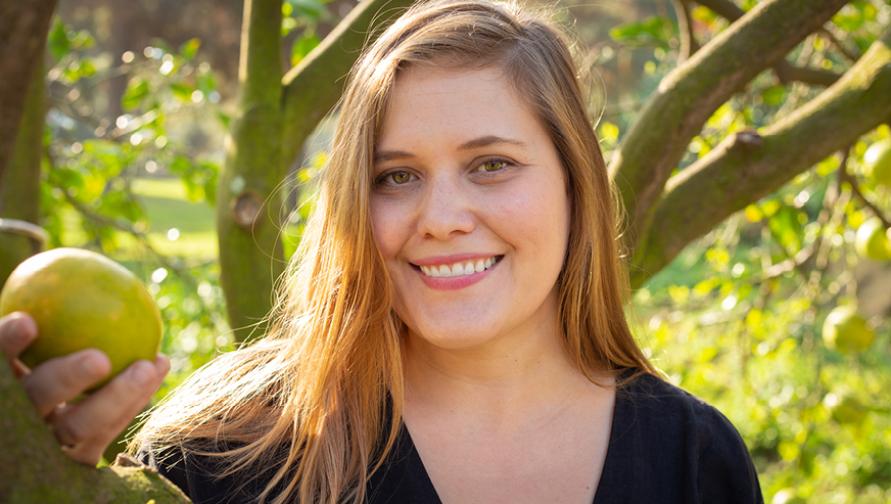
By Valerie Elwell
While the almond, soy or coconut milk creamer you may use in your morning cup of coffee seems innocuous enough, it is actually under intense legal scrutiny at this very moment. In a class action lawsuit driven by the dairy industry, plaintiffs have argued that non-dairy liquids should not be marketed as “milks.” This intersection between food, law, history and culture is where Clare Gordon Bettencourt, a University of California, Irvine Ph.D. candidate in history, finds her research sweet spot.
Bettencourt is at the forefront of an increasingly popular academic discipline broadly known as food studies: the critical examination of food and its contexts across a great variety of subjects like history, law, government, health, science and the environment. Her dissertation, “Bread and Butter Policy: America’s Food Identity Standards 1938-2018,” traces the history of the Food and Drug Administration’s food identity standards to understand how and why these regulations were written, and whom they were meant to protect.
“In recent years, the popularity of plant-based products like almond milk has prompted a debate about what constitutes ‘milk.’ This debate isn’t just for foodies; it reflects the FDA’s power to oversee the naming of foods through a little-known provision, initially created as a part of the Food, Drug, and Cosmetic Act of 1938: the food identity standards,” she says.
Currently, there are about 300 food identity standards in effect that dictate the ingredients and naming of many common foods like bread, peanut butter and cheese. And these standards are slow to change due to several industries’ investments in how certain products are marketed. This means that many food standards currently in place either do more for industries than for consumers, or are simply outdated. For example, there are standards that dictate how many cherries must be in a frozen cherry pie and what must be in the exact composition of French dressing.
“Food standards hold a massive influence on America’s food supply and yet, there hasn’t been a comprehensive study of them in the past eighty years,” says Bettencourt. Until now, that is. Bettencourt’s research suggests that the history of the standards reflects scientific, medical, cultural, and economic transformations of the twentieth century, including the health implications of processed foods, the capture of regulatory agencies, and public health concerns.
“There weren’t a lot of places where I could pursue this project,” she says. “Coming to UCI to work with Professor Yong Chen is a dream come true. Not only is he grounded in the discipline of history and knows all the methodology, but he is also an expert in food and at the forefront of the food studies conversation.”
Yong Chen, UCI professor of history, is a frequently cited expert on the history of immigrant food pathways. He is the author of Chop Suey, USA: The Rise of Chinese Food in America (Columbia University Press, 2014), teaches the popular class “What to Eat,” and this year worked with Professor of English Julia Lupton to take students out of the classroom and into the kitchen through Virtuous Table. As Bettencourt’s dissertation advisor, Chen has inspired Bettencourt to think about food legislation through various cultural and historical lenses.
Bettencourt’s fascination with pure food legislation and consumer activism burgeoned in her undergraduate years at the University of San Francisco (B.A. history ’09). She describes herself as a true believer in healthful food sourcing, and she wanted to get involved in any way she could. She started out volunteering for CUESA (Center for Urban Education about Sustainable Agriculture), an organization in San Francisco that runs farmers markets and sustainable food workshops. After graduating, she served in AmeriCorps teaching garden-based education to third-graders while also working at Whole Foods Market for many years.
While working at Whole Foods, Bettencourt realized that many customers had a common perception that the food system had been idyllic until somewhere in the middle of the 20th century.
“When Monsanto became a household name and consumers became aware of the production of genetically-modified organisms, this is when we see a shift to a ‘we can’t trust our food’ mentality,” she says. These discussions were the catalyst for her research. She wanted to see if and when these events actually occurred and who was responsible for the changes in our food supply.
She went to Scotland and obtained a master’s in history (MLitt, University of Glasgow ’13) under the tutelage of Matt Smith, professor of history. By that time, she knew there was much more to the story and applied to UCI.
One of her favorite discoveries is that people’s concerns about the safety and healthfulness of their food systems are nothing new.
“Throughout history, people have grappled with the same challenges we do when it comes to navigating the consumer marketplace and finding a balance. For instance, the idea of food additives has long made consumers uneasy, yet the convenience and popularity of processed foods has been undeniable since they emerged in the 19th century,” she says.
After completing her Ph.D., Bettencourt hopes to obtain a faculty position where she can continue researching food history and cultivate that interest in her students. She also wants to lend her voice to scholarly conversations and work to make food regulations more representative and equitable. She believes the best way to accomplish this is to increase consumer awareness of the food standards and involvement in the conversation.
“Providing more transparency and creating a hearings process that offers more opportunities for consumers and the non-governmental organizations working in the public interest could help put consumers back at the center of legislation that is meant to protect them.”
Find Clare Gordon Bettencourt on Twitter: @dearclare, @historecipes, and #foodidentitystandards
